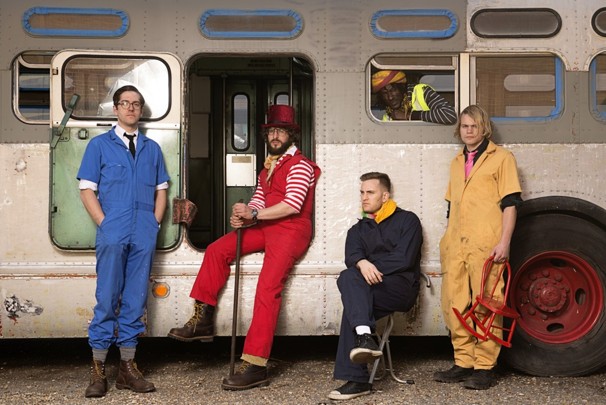 WASHINGTON DC – Justin Vitarello has traveled to Baltimore countless times to salvage parts for the three 1950s-era step vans that serve as the retro-cool Technicolor tin cans for his Fojol Bros. street-food operation. About a year and a half ago, during one particular trip to a junkyard in Charm City, Vitarello spotted a pair of ancient municipal buses sitting abandoned in a storage lot.
WASHINGTON DC – Justin Vitarello has traveled to Baltimore countless times to salvage parts for the three 1950s-era step vans that serve as the retro-cool Technicolor tin cans for his Fojol Bros. street-food operation. About a year and a half ago, during one particular trip to a junkyard in Charm City, Vitarello spotted a pair of ancient municipal buses sitting abandoned in a storage lot.
He immediately glimpsed the future of mobile vending.
In those two outcasts of public transportation from another time and place, Vitarello envisioned a new era of street food, in which customers wouldn’t eat on the grass or the sidewalk or even back at their desks. He imagined them sitting down to a meal in a 1957 bus retrofitted as a 21st-century dining car.
“When I walked into
The buses may also be a kind of peace offering in the ongoing war between food trucks and bricks-and-mortar restaurants, which tend to view mobile vendors as a combination of competitor, poacher, trespasser and wandering vagrant. Withnew vending regulations headed to the D.C. Council for a vote, Vitarello may have just hit upon a work-around to the city’s plan to create Mobile Roadway Vending locations, where trucks would enjoy expanded hours but probably find their numbers limited.
Vitarello and Fojol co-founder Peter Korbel want to use these buses to, as they say, “activate” new areas of the District — and elsewhere. They want to work with other food trucks, private developers and companies, arts organizations, anyone who’d be willing to work out a deal to bring street eats, a dining bus (or two) and lots of people to a single area, presumably removed from the spaces controlled by the District Department of Transportation and away from the major restaurant rows.
The buses are the latest innovation in an emerging trend to corral food trucks onto private property or parking lots, perhaps with patio seating or entertainment. Such gatherings have already been tried or adopted in cities including Portland, Ore. (where food-cart pods are a hit), Encinitas, Calif. (where a weekly truck event ran into permit difficulties) and the District itself (where the seasonal Truckeroo festival has proved popular).
FInd the entire article by Tim Carman at the Washington Post <here>



